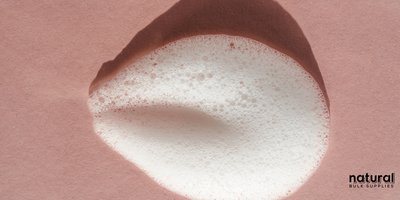Glucoside Surfactants & Types: Comprehensive Guide
Posted by Natural Bulk Supplies on on Apr 17th 2022
Glucoside Surfactants: Types, Benefits & Key Differences
Glucosides, also known as Alkyl Polyglucosides (APGs), are natural, biodegradable surfactants derived from plant-based fatty alcohols and glucose. Used in clean beauty, haircare, and skincare, they offer gentle cleansing, high foam stability, and excellent skin compatibility making them a favorite among U.S. formulators creating sulfate-free products.
What Is Glucoside?
A glucoside surfactant lowers surface tension to remove dirt and oils while staying mild and eco-friendly. Derived from renewable coconut, palm, or corn sources, glucosides are nonionic surfactants safe for sensitive skin and suitable for daily-use products like shampoos, cleansers, and body washes.
Popular Types of Glucosides
1. Decyl Glucoside
Made from coconut and corn, it offers rich foam and mild cleansing. Perfect for shampoos, gels, and soaps.
Foam: High and fast-forming
Best Use: Deep-cleansing yet gentle formulations
2. Coco Glucoside
Produced from coconut oil, this mild surfactant adds conditioning and hydration.
Foam: Stable and creamy
Best Use: Sensitive-skin cleansers and baby products
3. Lauryl Glucoside
A thicker surfactant made from coconut or palm oil with the most stable foam.
Best Use: Sunscreens, facial foams, and baby shampoos
Note: Slower to foam but provides excellent stability.
4. Caprylyl/Capryl Glucoside
A dual-purpose surfactant and solubilizer, great for mixing essential oils and water in cleansers and toners.
Best Use: Gentle face and body products that need fine, stable foam.
Glucoside Comparisons
|
Comparison |
Key Takeaway |
|
Decyl Glucoside vs Coco Glucoside |
Decyl foams faster; Coco gives creamier, more stable foam. |
|
Lauryl Glucoside vs Decyl Glucoside |
Lauryl foams slower but is thicker and more stable. |
|
Lauryl Glucoside vs Coco Glucoside |
Coco is gentler; Lauryl offers more structure and viscosity. |
|
Caprylyl/Capryl Glucoside vs Coco Glucoside |
Caprylyl/Capryl also works as a solubilizer; Coco is better for cleansing and hydration. |
Why Use Glucoside Surfactants
- Mild and Non-Irritating: Safe for all skin types
- Sulfate-Free: Perfect for clean, vegan, and eco-friendly formulations
- High Foam & Stability: Adds luxury to natural products
- Biodegradable: Better for both users and the environment
Conclusion
Whether you prefer Decyl, Coco, Lauryl, or Caprylyl Glucoside, each brings unique benefits to your hair and skincare formulations. Choosing the right glucoside helps balance foam, viscosity, and gentleness for your product type.
Explore glucosides in bulk at Natural Bulk Supplies, your trusted U.S. supplier for clean, high-performance surfactants.

